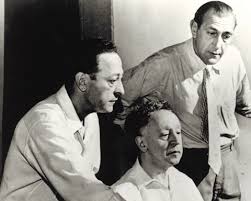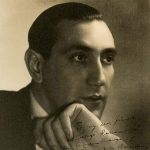
Rubenstein, Heifetz, Piatigorsky Trio
Arthur Rubinstein, piano
One of the 20th century’s two most iconic classical pianists, Arthur Rubinstein (1887–1982) was an elegant virtuoso, his mature playing a spontaneous balance of color, lyricism and verve, with a rich, warm tone; not only a recitalist and concerto soloist, Rubinstein was also an enthusiastic player of chamber music, collaborating over his long career with Jascha Heifetz, Gregor Piatigorsky, Henryk Szeryng, Emanuel Feuermann, Pierre Fournier and the Guarneri Quartet, among others. Of course, Rubinstein — who was born in Lódz, Poland — became the 20th-century embodiment of Chopin’s music, interpreting the Polish composer’s poetry with sinew as well as sighs. Although he recorded most of Chopin’s major works multiple times from the era of early electrical recording to the age of hi-fidelity stereo, Rubinstein commanded a vast repertoire beyond that — from Mozart, Beethoven, Schubert, Mendelssohn, Schumann, Liszt, Grieg, Tchaikovsky, Saint-Saëns and Brahms to Albéniz, Falla, Granados, Fauré, Franck, Debussy, Ravel and Rachmaninoff, plus select pieces by Stravinsky, Szymanowski, Villa-Lobos, Prokofiev, Poulenc and Bach-Busoni. His appetite for music — as with cigars, books, paintings, travel, food, wine, women – remained prodigious throughout his life.
–From Bambarger, Bradley. “Arthur Rubenstein.” Arthur Rubinstein – Steinway & Sons
Jascha Heifetz, violin
Jascha Heifetz, widely regarded as one of the greatest performing artists of all time, was born in Vilnius, Lithuania, which was then occupied by Russia, on February 2, 1901.. He began playing the violin at the age of two. He took his first lessons from his father Ruvin, and entered the local music school in Vilna at the age of five where he studied with Ilya Malkin. He made his first public appearance in a student recital there in December 1906, and made his formal public debut at the age of eight in the nearby city of Kaunas (then known as Kovno, Lithuania). With only brief sabbaticals, he performed in public for the next 65 years, establishing an unparalleled standard to which violinists around the world still aspire.
Heifetz had a long love of chamber music. He played it privately with friends throughout his life, and as early as 1934 performed Beethoven’s op. 127 string quartet publicly at a benefit concert at New York’s Town Hall for the Beethoven Association. He made legendary chamber music recordings with violist William Primrose, cellist Emanuel Feuermann, and pianist Arthur Rubinstein in the 1940s. After the untimely death of Feuermann in 1942, Heifetz formed a trio with Rubinstein and cellist Gregor Piatigorsky. They appeared in a series of four concerts at the Ravinia Festival just outside of Chicago in the summer of 1949, made a series of recordings, and were featured in a film. Critics quickly dubbed them the “Million Dollar Trio.”
Gregor Piatigorsky, cello
One of the pre-eminent string players of the 20th century, Gregor Piatigorsky was born in Ukraine in 1903, and died in Los Angeles in 1976. His international solo career lasted over 40 years, and especially during the 1940’s and early 1950’s he was the world’s premier touring cello virtuoso — Casals was in retirement, Feuermann had died, and the three artists who were to succeed Piatigorsky (Starker, Rose, and Rostropovich) were still in their formative stages. His one true peer, Fournier, was limited in his travelling abilities by polio. Thus, Piatigorsky had the limelight almost to himself. He was gregarious, loved to travel and perform anywhere, and he hobnobbed as easily with farmers in small towns as he did with Toscanini, Stravinsky, Rubinstein, and Schoenberg. It was a legendary career.
Piatigorsky was not a “child prodigy,” perhaps, but his talent manifested itself early and carried him quickly upward. He began to play at age 7, and was accepted as a student at the Moscow Conservatory two years later. By age 15 he was principal cellist of the Bolshoi Opera. Escaping the upheaval of the Russian Revolution in 1921, he studied with Julius Klengel (also Feuermann’s teacher) in Leipzig, and at age 21 became principal cellist of the Berlin Philharmonic under Furtwängler. In 1929 he left the orchestra to pursue a solo career. Piatigorsky always loved chamber music, and was a member of three different piano trios – first with Artur Schnabel and Carl Flesch, next with Vladimir Horowitz and Nathan Milstein, and finally with Artur Rubinstein and Jascha Heifetz.
History
Mendelssohn: Piano Trio No. 1 in D minor, Mvts 1 and 2
Arthur Rubinstein, piano; Jascha Heifetz, violin; Gregor Piatigorsky, cello
